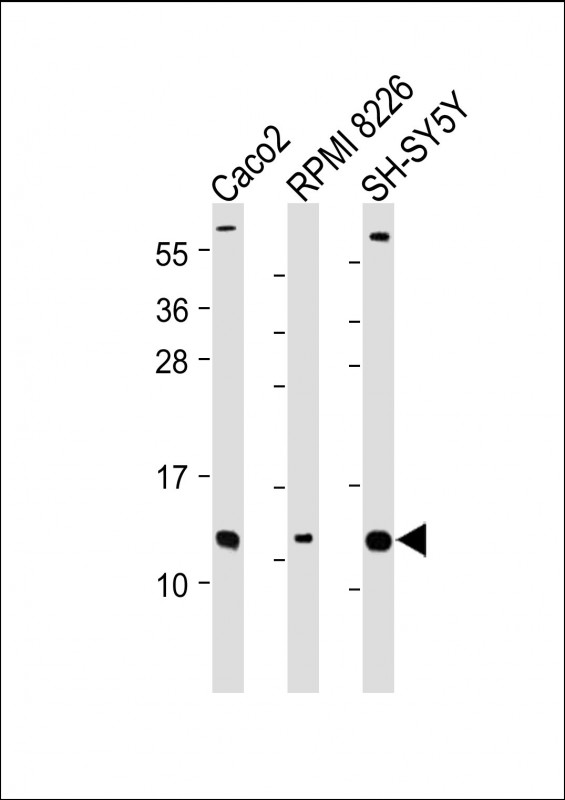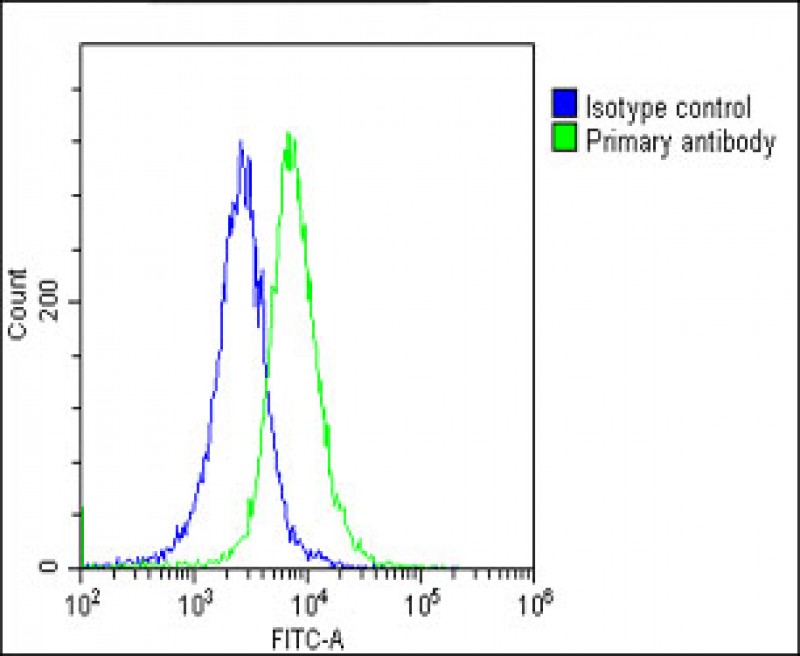

| WB | 咨询技术 | Human,Mouse,Rat |
| IF | 咨询技术 | Human,Mouse,Rat |
| IHC | 咨询技术 | Human,Mouse,Rat |
| ICC | 技术咨询 | Human,Mouse,Rat |
| FCM | 1/25 | Human,Mouse,Rat |
| Elisa | 咨询技术 | Human,Mouse,Rat |
| Aliases | Cyclin-dependent kinases regulatory subunit 2, CKS-2, CKS2 |
| Entrez GeneID | 1164 |
| WB Predicted band size | 9.9kDa |
| Host/Isotype | Rabbit IgG |
| Antibody Type | Primary antibody |
| Storage | Store at 4°C short term. Aliquot and store at -20°C long term. Avoid freeze/thaw cycles. |
| Species Reactivity | Human, Mouse |
| Immunogen | This CKS2 antibody is generated from a rabbit immunized with a KLH conjugated synthetic peptide between 6-40 amino acids from the human region of human CKS2. |
+ +
以下是关于CKS2(N-Term)抗体的3篇参考文献示例(注:文献内容为示例性概括,具体文献需根据实际研究检索确认):
---
1. **文献名称**:*CKS2 promotes cell proliferation and tumorigenesis in hepatocellular carcinoma via the PI3K/AKT pathway*
**作者**:Li X, Zhang Y, Chen H
**摘要**:本研究通过免疫组化(使用CKS2 N-Term抗体)发现CKS2在肝癌组织中高表达,并与患者生存率负相关。体外实验表明,敲低CKS2可抑制肝癌细胞增殖并阻滞PI3K/AKT信号通路,提示其作为肝癌治疗靶点的潜力。
---
2. **文献名称**:*CKS2 expression correlates with poor prognosis and immune infiltration in colorectal cancer*
**作者**:Wang R, Liu J, Gao S
**摘要**:利用CKS2 N-Term抗体进行Western blot和免疫组化分析,研究发现CKS2在结直肠癌中过表达,且与肿瘤分期和转移相关。进一步生信分析显示,CKS2高表达与肿瘤微环境中免疫抑制性细胞浸润增加有关。
---
3. **文献名称**:*Functional characterization of CKS2 in breast cancer stem cells using a domain-specific antibody*
**作者**:Chen L, Patel A, Kim M
**摘要**:通过CKS2 N-Term抗体特异性识别,研究发现CKS2在乳腺癌干细胞中显著富集。敲除CKS2可降低干性标志物表达并抑制肿瘤球形成能力,提示其在维持肿瘤干细胞特性中的关键作用。
---
如需具体文献,建议通过PubMed或Google Scholar检索关键词(如“CKS2 antibody N-Term”、“CKS2 cancer”)获取最新研究。
The CKS2 (N-Term) antibody is designed to target the N-terminal region of the CKS2 protein, a member of the CDC28 protein kinase subunit (CKS) family. CKS2 plays a critical role in cell cycle regulation by binding to cyclin-dependent kinases (CDKs), particularly CDK1 and CDK2. to modulate their activity during the G1/S and G2/M transitions. This protein is essential for proper cell cycle progression, DNA replication, and mitotic exit. Dysregulation of CKS2 has been linked to various cancers, where its overexpression correlates with tumor aggressiveness, poor prognosis, and resistance to chemotherapy.
The CKS2 (N-Term) antibody is commonly used in research to detect and quantify endogenous CKS2 protein levels via techniques like Western blotting, immunohistochemistry (IHC), and immunofluorescence (IF). Its specificity for the N-terminal region ensures recognition of full-length CKS2 while minimizing cross-reactivity with other CKS family members, such as CKS1. Researchers employ this antibody to study CKS2's role in oncogenesis, cell cycle checkpoints, and therapeutic response in cancer models. Additionally, it aids in exploring CKS2 interactions with CDKs and other regulatory proteins, providing insights into mechanisms underlying genomic instability and uncontrolled proliferation in malignancies. Validation of the antibody typically includes knockout/knockdown controls to confirm target specificity.
×